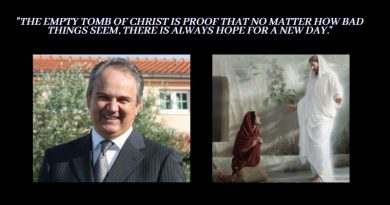Reconcile with God, little children, and you will see miracles around you!
Reconcile with God, little children, and you will see miracles around you!
These were the very last words of the message which Our Lady gave to Maria Lunetti for the world on Wednesday November 25th 2020. In themselves these golden words are a heartfelt invitation from Our Heavenly Mother to resort to the great sacrament of confession.
We have to admit the whole truth if we really want to get healed: when confession gets scarce it is there that true problems truly arise. Many times we neglect the fact that confession is indeed the sacrament of healing we desperately need. We tend to overlook the reality that miracles do really happen in confession. On this point I cannot not quote what Jesus says to St. Faustina in her Diary when he squarely told her in entry 1448:
Write, speak of My mercy. Tell souls where they are to look for solace, that is, in the Tribunal of Mercy [the Sacrament of Reconciliation]. There the greatest miracles take place [and] are incessantly repeated. To avail oneself of this miracle, it is not necessary to go on a great pilgrimage, or to carry out some external ceremony; it suffices to come with faith to the feet of My representative and to reveal to Him one’s misery, and the miracle of Divine Mercy will be fully demonstrated. Were souls like a decaying corpse so that from a human standpoint there would be no [hope of] restoration and everything would already be lost, it is not so with God. The miracle of Divine Mercy restores that soul in full.
Yes! Confession is the sacrament of solace and of the greatest miracles! How many times, as a priest, I have witnessed this myself when a person comes to confess with deep sorrow and contrition for his and her sins! As I personally felt it when I went to confess myself too! How many people I accompanied to the Heavenly Jerusalem simply because they made a sincere confession before dying on their deathbed at the Oncology Centre where I work as a chaplain! The power of confession is really indescribable!
Once, a person, after a great confession and a big U-turn he did in his life, told me days before he passed away: “Father, I am seeing a monster there! His look is terrifying me!” “Don’t give him much attention,” I told him. “Just say with deep faith and love to Jesus: JESUS I TRUST IN YOU!” The peace this person had when he died was purely and simply heavenly! How much comfort does confession produce to those who approach it with humility, faith, and a docile heart to let God restore them by His amazing paternal love!
In view of 25th November 2020 message as well as keep in mind what Jesus said to St. Faustina in her Diary, now I can really appreciate more and more what the Church teaches about this wonderful sacrament of healing. In fact, the Cathecism of the Catholic Church outlines the effects of this sacrament in numbers 1468 till 1470. It says:
“‘The whole power of the sacrament of Penance consists in restoring us to God’s grace and joining us with him in an intimate friendship.’ Reconciliation with God is thus the purpose and effect of this sacrament. For those who receive the sacrament of Penance with contrite heart and religious disposition, reconciliation ‘is usually followed by peace and serenity of conscience with strong spiritual consolation.’ Indeed the sacrament of Reconciliation with God brings about a true ‘spiritual resurrection,’ restoration of the dignity and blessings of the life of the children of God, of which the most precious is friendship with God.
This sacrament reconciles us with the Church. Sin damages or even breaks fraternal communion. The sacrament of Penance repairs or restores it. In this sense it does not simply heal the one restored to ecclesial communion, but has also a revitalizing effect on the life of the Church which suffered from the sin of one of her members. Re-established or strengthened in the communion of saints, the sinner is made stronger by the exchange of spiritual goods among all the living members of the Body of Christ, whether still on pilgrimage or already in the heavenly homeland:
It must be recalled that . . . this reconciliation with God leads, as it were, to other reconciliations, which repair the other breaches caused by sin. The forgiven penitent is reconciled with himself in his inmost being, where he regains his innermost truth. He is reconciled with his brethren whom he has in some way offended and wounded. He is reconciled with the Church. He is reconciled with all creation.
In this sacrament, the sinner, placing himself before the merciful judgment of God, anticipates in a certain way the judgment to which he will be subjected at the end of his earthly life. For it is now, in this life, that we are offered the choice between life and death, and it is only by the road of conversion that we can enter the Kingdom, from which one is excluded by grave sin.79 In converting to Christ through penance and faith, the sinner passes from death to life and ‘does not come into judgment.’”
If we just pause a bit at these comforting words Mother Church is telling us, in her edifying teaching, we can easily understand why Our Lady, in this message, is insisting with us to “work and build peace through the Sacrament of Confession”. If we just imagine that each confession we make, in this Tribunal of Mercy, at the feet of the priest, Jesus’ representative on earth, is an experience of restoration to God’s grace, intimate relationship with him, peace and serenity of conscience, spiritual consolation, spiritual resurrection, the dignity and blessings of the life of the children of God, fraternal communion, strengthening in the communion of saints by exchanging spiritual goods with other believers, being reconciled with ourselves by reattaining our innermost truth, being reconciled with all creation, in other words we go from death to life in Christ, provided that we cultivate a contrite and a religious disposition, how can we dare refuting ourselves this great solace and let, instead, ourselves rot in sin and death? If the Father’s mercy in this sacrament is for us love, warmth and joy, how can we live without it?
Peace and real progress direly demands a strong spiritual life where reconciliation with God, oneself and others becomes it norm. How truly prophetic Pope Benedict XVI was on this point when, in his famous encyclical which speaks about integral human development in charity and truth, Caritas in Veritate, says:
“Development needs Christians with their arms raised towards God in prayer, Christians moved by the knowledge that truth-filled love, caritas in veritate, from which authentic development proceeds, is not produced by us, but given to us. For this reason, even in the most difficult and complex times, besides recognizing what is happening, we must above all else turn to God’s love. Development requires attention to the spiritual life, a serious consideration of the experiences of trust in God, spiritual fellowship in Christ, reliance upon God’s providence and mercy, love and forgiveness, self-denial, acceptance of others, justice and peace” (no.79).
A final note, for us priests confessors, comes from Pope Francis in his apostolic exhortation on the proclamation of the Gospel in today’s world, Evangelii Guadium, when he exhorts us:
“I want to remind priests that the confessional must not be a torture chamber but rather an encounter with the Lord’s mercy which spurs us on to do our best. A small step, in the midst of great human limitations, can be more pleasing to God than a life which appears outwardly in order but moves through the day without confronting great difficulties. Everyone needs to be touched by the comfort and attraction of God’s saving love, which is mysteriously at work in each person, above and beyond their faults and failings” (no. 44).
Let us let the Father build us up on the peace He gives us every time we give him permission to attract and comfort us by His saving love as is concretely manifested to us by the sacrament of confession. After all, it is a reconciled heart that can actually sow seeds of reconciliation and a forgiven heart that can truly forgive by overcome[ing] evil with good (Rom 12:21).
Fr Mario Attard OFM Cap





